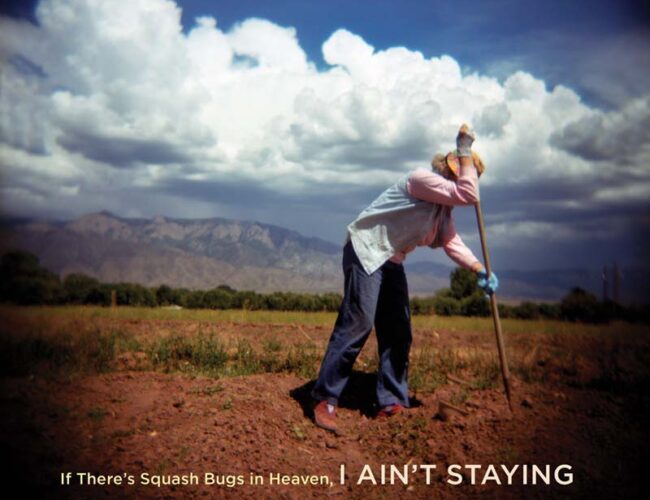If There’s Squash Bugs in Heaven, I Ain’t Stayin’
BY STACIA SPRAGG-BRAUDE
The farm these harvest days is gold and earthy, a ten-year-old at the end of summer, all tanned and callused and rule-free. Fruit isn’t so much picked from the trees as it simply surrenders. Tomatoes fattened on sun and monsoon cascade over their caging and down into the furrows. Grooves form and split across the shoulders of the beefsteaks. Harvesting lasts past dinner. Why would you go out among your rows now without a basket? But you still do, and by the time you’ve reached the end of a row, you’ve filled the hollow of your stretched shirt with ripe tomatoes and handfuls of beans.
It is my first time this week scaling a harvesting ladder high into the apple trees. It’s important to harvest apples just right—twist don’t pull—or else you risk tearing off what will become next year’s apples. Don’t grip the fruit either or it will bruise. Just let it rest in the cup of your hand. We pick as much as we can, filling apple bags strapped to our chests as we balance atop ladders. Then carefully down, rung by rung, with our pregnant fruit tummies we open the bags gently, and the apples flow into the wooden crates below.
What isn’t eaten or sold will be pressed into cider next month. We try to get all the apples on all the trees, but there are many and it takes a lot of time. It costs more to hire someone to finish picking and keep the cooler room running than Evelyn can make selling the apples, so some will have to be forgotten on the trees. The crows will take passing bites. The rest will be put back into the earth as compost for another time. [ . . .]
One Sunday at the growers’ market a customer sampling one of Evelyn’s apples says, “Hey, I think there’s a little worm in here.” “Really?” Evelyn replied, “Well, I’ll throw him in for free.”
Such exchanges give Evelyn a chance to step up on one of her favorite soapboxes: “There may be little marks on these apples, but at least they’re not embalmed like they are at the grocery store.” Quite often, commercial fruit is picked before it’s had a chance to ripen and fill with sweetness. Any fruit misshapen or too small is discarded. Homogeneity is the industry’s standard of perfection. Any fruit that can’t survive being shipped thousands of miles is generally avoided. Apples are inundated with pesticides to ward off any other life-form and coated in wax for shine. Then they’re hit with gases and stored in darkened containers full of nitrous oxide to slow the aging process before being sent to the stores. In other words, they are embalmed.
Home-grown and homemade can wear the quirks and marks of its imperfect existence, the wrinkles and occasional blemishes earned from a life lived among sun and birds, spring frosts, summer hailstorms, winds from the west, things not anticipated.
Excerpted from the Museum of New Mexico Press book If There’s Squash Bugs in Heaven, I Ain’t Staying: Learning to Make the Perfect Pie, Sing When You Need to, and Find the Way Home with Farmer Evelyn, photographs and text by Stacia Spragg-Braude. Jacketed hardcover, $29.95, 200 pages, 38 plates. This and other publications by the Museum of New Mexico Press are available at bookstores and museum shops, including the Museum of New Mexico Foundation Shops in Santa Fe, or by calling 800-249-7737, or at mnmpress.org.

